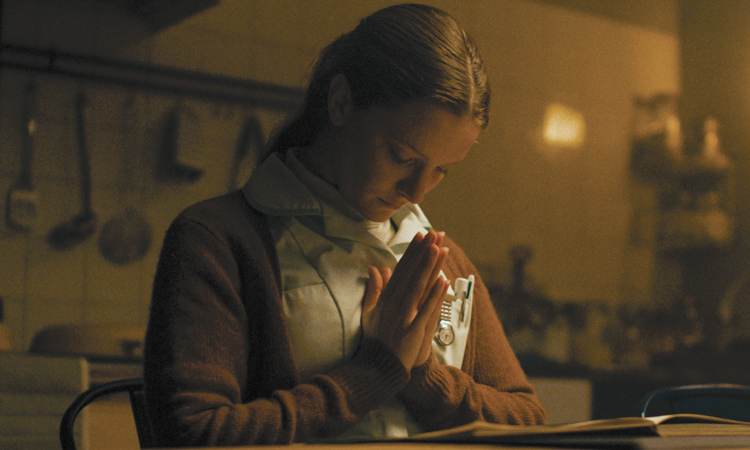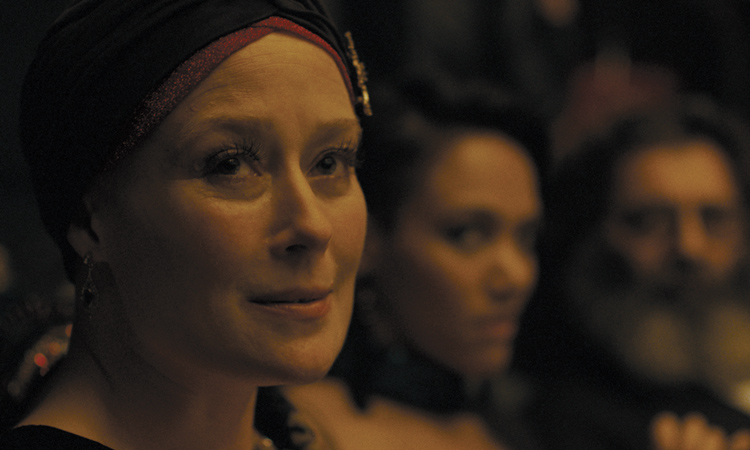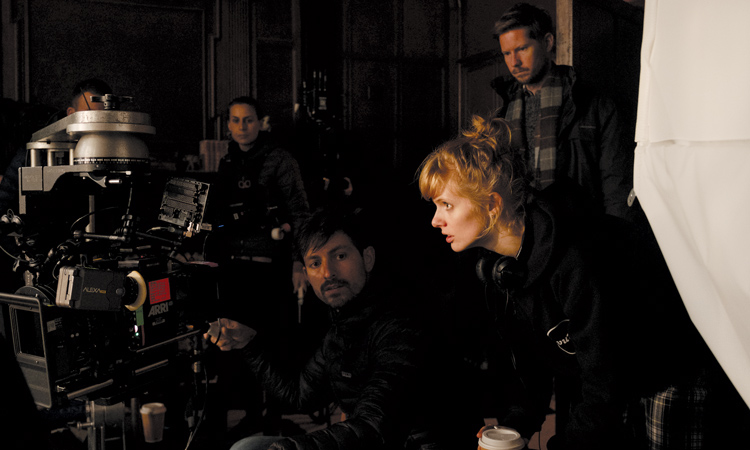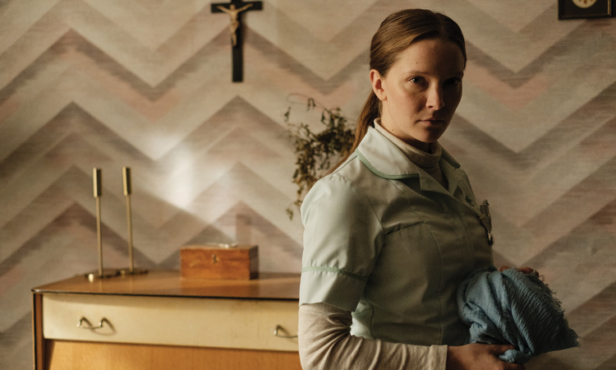“I’ve always been interested in the divide between the weird, messed-up private bubble we’ve all got going on in our heads and how different that can sometimes be from the way we present ourselves to the rest of the world,” says Rose Glass, director of the tense psychological horror Saint Maud. Together with Morfydd Clark (soon to be seen as Galadriel in Amazon’s highly-anticipated Lord Of The Rings series), the duo have crafted a film that’s swiftly become one of the year’s finest horror offerings.
Taut, dark and deeply unsettling, Glass’s quietly confident debut throws into question themes of religion and mental health while not shying away from addressing a real terror that lives amongst us: our failure to support society’s most vulnerable members.
Clark’s Maud is in a bad place. Having suffered a tragedy glimpsed only in murky flashbacks, she has found solace in palliative care and religion, convinced that God has a plan for her and that plan will soon make itself known. However when the voice in her head starts getting louder – a voice she believes to be the Almighty – Maud’s fragile recovery quickly takes a dark detour.
“The initial hook was Maud hearing the voice of God in her head, falling in love with it and developing a kinky, sado-masochistic romance,” says Glass of the film’s core concept, which was conceived while she was still at film school. “I was thinking about society’s reaction. A couple of thousand years ago if someone said they speak to God they might be revered as a saint or having a holy calling, whereas now if you say you hear the voice of God you might get quite a different reaction from people. I found that juxtaposition interesting,” she tells us. “If Joan of Arc existed today, what might have happened to her? Probably something quite different.”

When we meet Maud she’s arrived at the home of the terminally-ill Amanda (Jennifer Ehle) to provide some end-of-life nursing care. At first, the pair’s fast-friendship serves as a much-needed balm for their shared loneliness and despair. However as Maud’s relationship with the voice in her mind takes hold, this saving grace is sadly short-lived.
“I feel like he is just a friend to her,” suggests Clark of her character’s intimate relationship with God. “He’s a friend to a woman who has absolutely nobody who cares about her and that’s the most intoxicating thing. He listens to her and is interested in her in a world where she may as well be part of the wallpaper. The damage we do to people by just ignoring them is huge. God highlights Maud’s loneliness because he’s just there to listen and he makes her feel like life’s worth living.”
For Clark, the inevitability of Maud’s tragic story was something she instantly connected with: “I really saw it,” she tells us. “Despite everything that happens I understood every step she took and that’s what was so great about the script – it was shocking and unexpected and made sense. I can understand how she got so lost and that was something that I found terrifying about it.”
For Glass, finding the right person to tell Maud’s story was equally crucial: “The character goes to such extreme places and does some really horrific things. For me, the test of the film was to see if you could get the audience to completely go there with her and empathise and understand where she’s coming from – so it needed to be someone who you are drawn to,” she reasons. “At the same time, she has all these contradictory elements. I never wanted her to be entirely sweet. She’s arrogant, deluded, insecure and petty in some places, and perfectly flawed like the rest of us.”
As Maud’s internal interactions with God become more intense, her relationship with the ailing Amanda becomes more fraught. Before long, Glass’s troubled heroine is convinced her mission from God has finally arrived – and it’s one that will require her to save her new patient from herself.

“The story I wanted to tell was entirely from Maud’s perspective,” says the director about the film’s focus on the perils of isolation. “She sees what she is doing as incredibly important and looks up to God. When the alternative and the reality around you is as bleak as hers is, it’s far more appealing to submit yourself to this holy mission. I wanted the story to be told in grand scales and for us to feel the excitement of what’s going on with her. It was fun trying to think of different ways that somebody could experience God and ecstasy.”
“Amanda emboldens Maud and she’s accidently complicit in making her feel like she’s her saviour,” Clark adds. “Maud has been waiting and waiting for this thing that she knows God must want her to do – otherwise what’s the point? The decadence of Amanda is really intoxicating.”
Struggling with her situation, the pious Maud resorts to self-flagellation in order to prove herself in a series of bloody sequences that aren’t for the faint of heart. “I’ve loved that,” chuckles Glass, keen not to spoil any of her film’s teeth-clenching sequences for new viewers. “One of the joys of seeing it with audiences has been the visceral reaction, whether it’s people gasping, screaming or laughing. There’s something involuntary about it. You hope audiences do all those things in the places you hoped they would – but you never really know. That’s the lovely thing about watching films in the cinema, it’s this shared experience.”

As for Clark, Maud’s extreme actions brought her right to the cusp of her cringe-cinema limits: “Saint Maud is my ultimate horror in terms of my personal fears,” she tells us. “The type of gore that scares me most is when I really believe the person. The more normal they are, the more horrible it is. The small-scale grossness of what Maud does, I find really horrible. I’ve seen it a few times now and I still don’t like it.”
With Maud’s self-destruction comes a rather distinct feeling that her fate is the result of a thousand tiny failures and one that could have easily been avoided had someone cared, noticed or acted just a little bit sooner. However, perhaps scariest of all is the fact that its real terror lays beyond the confines of the cinema screen, hiding in plain sight in the overlooked hurt we sometimes cause others on a day-to-day basis.
“It was a slow crushing with all these micro-aggressions just slowly chipping away at her,” suggests Clark of Maud’s fragile state of mind. “Obviously we see that some event has happened in her past but have huge things happened or is it just the daily grind of being alive in a world that isn’t kind? I feel that as human beings we can make a difference by just being nicer to people in terms of the little damage we do accidentally.”
Still, while mental illness is an undercurrent of Saint Maud, Clark was reluctant to dish out labels: “I didn’t want to diagnose her because I just don’t know enough. I find the fragility of the human condition really interesting and I’ve always loved watching films where someone slowly disintegrates.”
Despite all of Saint Maud’s shocks, it’s this sobering sentiment that Glass is keen to share with viewers: “If the film’s about anything, it’s about that,” she says, discussing the unlikely positive message hidden within Maud’s tragic story. “It’s a call for compassion and the importance of trying to put yourself in other people’s shoes. It’s sometimes easy – but also dangerous and lazy – to just dismiss people who behave in a certain way. Maud is led to an extreme, awful place but things like that very rarely happen overnight. There’s usually a long trajectory and many points where if somebody had intervened, been more compassionate or reached out then maybe things could have turned out very differently.
“I hope that in spite of the extreme, bonkers places that Maud ends up going, people connect with the character,” adds Glass. “I’d like to think we’re motivated by very similar, universal things – we just go about it in a different way.”
Clark has a similar view: “What’s so awful about Maud is that she’s a ticking time bomb that everyone’s just passing. Ultimately, I think that despite the film being quite a brutal horror it’s incredibly empathetic and caring to its protagonist – and that’s why I think Rose is so wonderful. She’s utterly non-judgmental and has a huge amount of empathy for everybody,” she says. “I really hope that it makes people feel that a little bit of care goes a long way because that’s what it did for me. I never wanted to be someone who meets someone like Maud and makes her day a little bit worse, in the same way that I’ve also felt a bit Maud-y and somebody has made my day a bit worse. You can’t expect individuals to save people, it needs to be everybody.”
Saint Maud is released in cinemas on 9 October.
